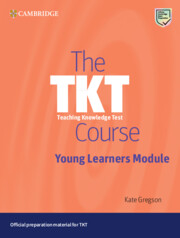Book contents
- Frontmatter
- Acknowledgements
- Contents
- Introduction
- Part 1 Knowledge of young learners and principles of teaching English to young learners
- Part 2 Planning and preparing young learner lessons
- Part 3 Teaching young learners
- Part 4 Assessing young learner learning in the classroom
- Follow-up activities: Answer keys and commentaries
- List of terms found in the TKT Glossary
- Glossary of TKT: Young Learners terms
- Test tips for TKT: Young Learners
- Teaching knowledge test young learners: Practice test
- Sample test answer sheet for TKT: YL practice test
- Answer key for TKT: YL practice test
Reflection on learning in Part 2
Published online by Cambridge University Press: 14 March 2024
- Frontmatter
- Acknowledgements
- Contents
- Introduction
- Part 1 Knowledge of young learners and principles of teaching English to young learners
- Part 2 Planning and preparing young learner lessons
- Part 3 Teaching young learners
- Part 4 Assessing young learner learning in the classroom
- Follow-up activities: Answer keys and commentaries
- List of terms found in the TKT Glossary
- Glossary of TKT: Young Learners terms
- Test tips for TKT: Young Learners
- Teaching knowledge test young learners: Practice test
- Sample test answer sheet for TKT: YL practice test
- Answer key for TKT: YL practice test
Summary
Well done, you have completed Part 2. This part of The TKT Course: Young Learner Module aimed to extend your understanding and skills in planning and preparing lessons for young learners, and in analysing, selecting, adapting and modifying materials and resources for learning. This part also developed your knowledge and skills in preparation for the second part of the TKT: YL Module test: Planning and preparing young learner lessons.
Look back to the introduction to this part of the book. There, you assessed your understanding before beginning the unit. Re-assess your understanding in each area.
You also wrote some questions or identified areas to find out more about in each unit. How well do you think you have achieved these? What can you do to better achieve those you need to work on? For example:
Re-read a section of the unit(s).
Re-do or do more exploration activities (Second C of each unit).
Discuss the unit(s) content with other teachers in your school or network.
Re-do the TKT: YL practice task(s).
Look in the TKT glossary or the glossary in this book to check meanings of key terms and concepts you are unsure about.
Reflect on your classroom teaching more closely.
Look for other readings or resources on the topic(s).
Write yourself two or three objectives for further learning and development in your TKT: YL PD Journal.
■ References and further recommended reading
PART 2 REFERENCES
Moon, J. (2000). Children Learning English. Oxford: Macmillan.
Nixon, C. and Tomlinson, M. (2018). Power Up. Pupil's Book. (New Ed.), Level 2. Cambridge: Cambridge University Press&Assessment.
Science Skills Level 1, Pupil's Book. Cambridge: Cambridge University Press&Assessment.
RECOMMENDED FURTHER READING
Arnold, W. and Rixon, S. (2008). Materials for Teaching English to Young Learners. In B. Tomlinson, English Language Learning Materials. A Critical View. London: Continuum.
Bland, J. (2023). Compelling Stories for English Language Learners. London: Bloomsbury.
Dobbs, J. (2001). Using the Board in the Language Classroom. Cambridge: Cambridge University Press&Assessment.
Garton, S. and Copland, F. (Eds.) (2019). The Routledge Handbook of Teaching English to Young Learners. (Part 4 – Technology and Young Learner Curriculum). London: Routledge.
- Type
- Chapter
- Information
- The TKT Course Young Learners Module , pp. 75 - 76Publisher: Cambridge University PressPrint publication year: 2024



